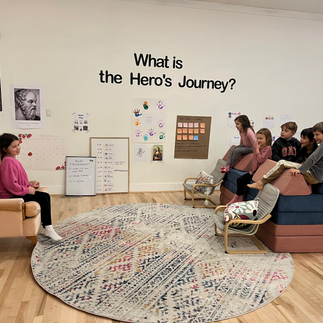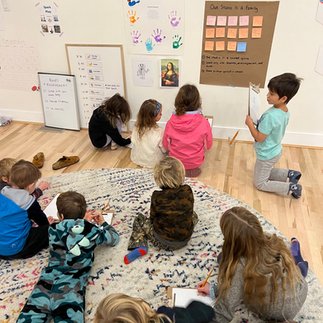Week 12 got off to an exciting start, with the arrival of our second (pink) Kiddie Couch! These couches are such a hit for lounging on during core skills work, reading books during D.E.A.R., or fort building during Spark Play, so to have another was cause for celebration. On the heels of the excitement came a fresh point of conflict: some felt only the girls should use the pink couch and the boys should only use the blue. Others felt this was unfair and made sure to say so, and in no time at all the excitement turned to arguing. I couldn't have scripted a more perfect opportunity for a Socratic discussion! We all gathered around on our circle rug and I presented them with a Socratic question: "Would you like to allocate rights to couch use based on gender and couch colour - yes or no, and why?". We took a vote and then proceeded to go around the circle stating our position and giving our reasoning. The first learner to speak had voted no, and his reasoning was because to do so would be excluding, and that violates our studio contract. Another got up and pointed to a chart on our wall - work from a recent brainstorming session we'd had where we wrote down various examples of violations of our contract, and said "because it's all of these things". Another said, "I don't know exactly why I say no, it just feels like it's not right." One of the learners who had voted yes to this idea voiced her reasoning - "because pink is a girls colour, and if a boy wants to use that couch he might get made fun of." I asked the group, "Who here likes the colour pink?" Interestingly, all of the boys raised their hands, and the girl who expressed this concern didn't and said, "I actually don't even like pink". I then asked her, "Knowing what you know now, that all of the boys here do like pink, do you still have this concern?", and she responded "no". One of the learners then said, "Besides, bullying is a violation of our contract!" After everyone had a chance to voice their choice, state their reasoning, and then listen to their peers do the same, we took another vote. "Would you like to allocate rights to couch use based on gender and couch colour? Raise your hand for yes." Not a single hand was raised. I said, "Ok, are we unanimous then? Everyone agrees that everyone should be able to use either couch?" There were big smiles all around, there was a resounding "YES!" and we all moved forward with our day with this new agreement which these children had come to themselves.
Of course, it would have been much quicker and easier for me to have just stepped in, said "No! Stop this, we must share everything!". The end result would have been the same, but the impact would have been completely different. In one example (the latter), there is no empowerment. Children learn they must seek out and defer to an adult authority figure to solve their problems. They gain no understanding of the opposition's thinking or reasoning, are left to rely purely on assumptions which can lead to resentments, and are not exposed to potentially a better way of thinking. In the former, the adult in the room was merely a facilitator for the conversation; the learners came away with a clear understanding of each other's reasoning and thought process and the "best" logic settled the disagreement. On top of all of that, the decision they came to, they came to independently and with full agency. This is the big learning we talk about at Acton, and moments like these get me so excited about this incredible program and all that it offers young people.
On Wednesday morning, the children came to circle and were quickly aware of, and curious about, some new artwork on the wall: a picture of a robot alongside one of the Mona Lisa. They were invited to take 5 minutes to draw, to the best of their ability, one of those two images. They were very intrigued as to where this was going, but I promised them all would be revealed once the 5 minutes were up. They went to work, and those who didn't wish to participate quietly observed. Once the timer went off, they were asked to rate their drawing on a scale of 1 to 4, with 1 being "looks nothing like it" to 4 being "identical". They were then invited to share the rating they had given themselves and why. After this short exercise, we read a story by Peter Reynolds called, "ish". In it, a young boy named Ramon loves to draw, but after his artwork is ridiculed by his older brother, he becomes discouraged and stops drawing altogether. He abandons his passion for perfection, convinced that his creations aren't "right." One day, his younger sister, Marisol, finds one of Ramon's discarded drawings and interprets it in her own way, pointing out that it still looks beautiful "ish." This small yet powerful word—"ish"—helps Ramon realize that art doesn’t have to be perfect to be meaningful or valuable. Instead, it can be an expression of personal joy, imagination, and individuality, regardless of how close it comes to an idealized standard. The story encourages children to embrace their unique perspectives and take pride in the process of creating, rather than focusing solely on the outcome. It aligns so perfectly with our philosophy at Acton - where effort is valued far above outcome.
After this story, we discussed the negative impact words can have, and then brainstormed positive words we can use to celebrate -ish progress for those who keep trying and trying and never give up. We were then challenged to use these words throughout our day together.
These heroes continue to make big progress every week on their core skills (reading, writing, and math). Moving their "avatar" along our themed maps to track their progress has been a huge motivator, and it's heartwarming to witness them cheering each other on as they progress side-by-side, or encourage their peers to catch up. This week one of our learners was completing her final level in her math program, which means advancing to a new "island" (equivalent to the next grade level). Her friends gathered around to cheer her on, and they were as excited as she was when she got to ring that bell and add another badge to her crest. Quickly after, they sat back down to their computers with renewed energy and motivation to push ahead further themselves. The brilliance of gamifying learning in action!
Communication skills are something we value and work on regularly in our studio. This week we had a powerful launch around "icy, hot, and warm" communication. To make this a visceral learning experience, we brought out 3 containers of water. One held water with ice cubes, one held warm water, and the other held hot water. The guide passed each around; first the icy, then hot, then warm. Children dipped their fingers in and afterwards were asked which was the most comfortable? We then discussed how when something is bothering us, our words and actions can reflect different temperatures. Icy behaviour shows we're upset without saying much, if anything. Hot behaviour is loud and often hurtful. Warm behaviour, on the other hand, is calm, respectful, and peaceful. The learners were then asked to identify various behaviours as either icy, hot, or warm, such as ignoring someone, yelling at them, using a calm voice, saying mean things about someone to another person, etc. They were then given a treasured recipe for warm words: using "I feel" statements, such as "I feel sad when you ignore me." We then roll played various scenarios; someone calling you a name, someone knocking over a magnatile tower you'd built, etc. using this special and powerful recipe. Lastly, we went over various techniques one could use to bring yourself to a "warm" temperature before responding, such as counting to 10, thinking a nice thought about the person, and taking a long deep breath. Not more than 2 hours later I witnessed this in action, when things got heated between two learners during Spark Play. When one yelled at the other I heard one say, "Those are hot words!" His friend then responded with an "I feel" statement, and the situation was immediately diffused. This is something that will come up again and again, and we'll continue to work on this important life skill, but the experience of linking the emotional response to a physical sensation was very powerful, and will help equip these young heroes to make great decisions going forward.

This journey, bringing Acton Academy to Nanaimo, has been life changing...and we're only at the beginning. Change can be scary, and like all Hero's Journeys there have been moments of intense self-doubt, fear, and many other monsters I've had to face. Saying yes and crossing that threshold has been the greatest gift, and I feel so lucky to have these incredible young heroes as my guides and fellow travellers.
In the words of Socrates, who inspires so much of what we do at Acton, "The secret of change is to focus all of your energy not on fighting the old, but on building the new."


















Comments